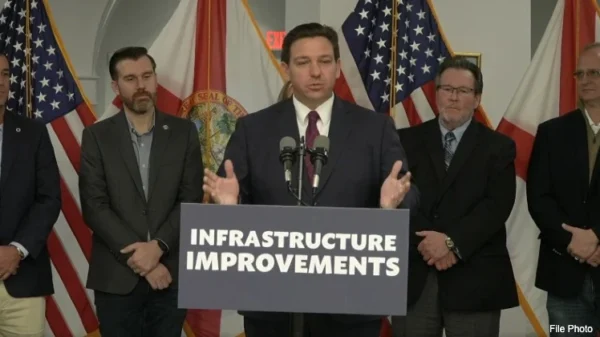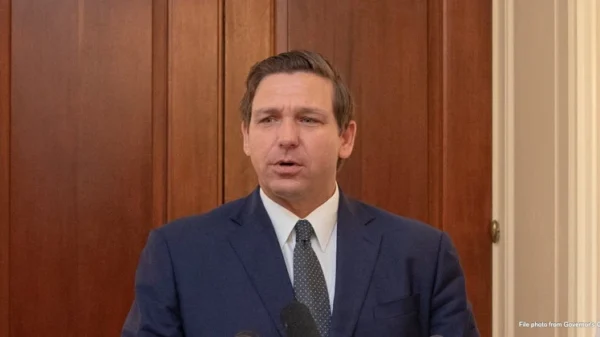At the end of last week, Gov. Ron DeSantis announced that more than $148 million has been awarded to communities through the Florida Department of Economic Opportunity’s (DEO) Rebuild Florida Mitigation General Infrastructure Program.
The program, administered by DEO, allows local governments to develop large-scale infrastructure projects to make communities more resilient to future disasters.
“My administration remains committed to providing the resources necessary for Florida communities to build back stronger and be more resilient to future storms,” said DeSantis. “This transformational mitigation funding will go a long way in helping Florida’s communities invest in their futures through critical infrastructure improvements.”
“This Lake Bonnet project is a perfect example of government working well,” said U.S. Rep. Scott Franklin, R-Fla.,. “It is a model for what success looks like in a public, private partnership that will help a needed community, clean up a lake ecosystem and provide a new park that the entire Lakeland community can enjoy. It is a shining example of government and the private sector at all levels, working together on behalf of our community. I applaud Governor DeSantis for his support of this project and thank everyone at every level who has supported the vision for this project and contributed to this momentous occasion.”
The funds are allocated to the state through the U.S. Department of Housing and Urban Development’s (HUD) Community Development Block Grant – Mitigation (CDBG-MIT) program formed in response to the 2016 to 2017 presidentially declared disasters.
“Under Governor DeSantis’ strong leadership, our state continues to provide investments to ensure the resiliency of Florida communities,” said DEO Executive Director Dane Eagle. “The Rebuild Florida Mitigation General Infrastructure Program provides storm-impacted communities the opportunity to complete large, high-impact infrastructure projects that will pay dividends for future generations.”
“We are so honored to have Governor DeSantis here in Lakeland today to award grant funding for this extraordinary and transformative project. The scope of this project mitigates flooding in a traditionally underserved community, cleans one of Florida’s most impaired waterbodies, and prevents polluted stormwater runoff from flowing through the City of Lakeland to Tampa Bay,” said state Sen. Kelli Stargel, R-Lakeland, the chairwoman of the Senate Committee on Appropriations. “This innovative public/private partnership between Bonnet Springs Park and the City of Lakeland allows this project to access millions in mitigations funds, making this project more wide-ranging than simply relying solely on government funding. Governor DeSantis and the Florida Legislature have worked together to address flooding across our state in a responsible and forward-thinking manner that makes the best use of limited taxpayer dollars. This project is a great example of this effort as the mitigation will stop pollution from flowing into the local and regional water and will provide a solution to end future pollution altogether. This project touches many people, places and sensitive waterways and we are so grateful to the Governor for his support.”
DEO is awarding the following communities funding through the Rebuild Florida Mitigation General Infrastructure Program:
- Broward County ($6,250,000) – to construct an interconnect between the Broward County Reuse Facility and the City of Pompano Beach’s OASIS Reuse facility.
- City of Arcadia ($4,823,579) – to widen a stormwater tributary to provide additional storage during storm events to better control flood volume.
- City of Avon Park ($670,623) – to improve the existing potable water system through replacement of asbestos pipes with PVC piping, adding additional bore to improve water pressure, and to install an upgraded chlorine system.
- City of Doral ($1,000,000) – to reduce the frequency and severity of stormwater flooding by providing a positive-gravity drainage outfall discharging into the NW 58th Street canal.
- City of Fort Lauderdale ($10,500,000) – to replace aging and undersized stormwater infrastructure with new infrastructure systems that help with neighborhood flooding issues and provide better water quality treatment prior to releasing into the intracoastal waterway.
- City of Key West ($3,099,159) – to install tide valves at 40 stormwater outfall points of discharge to address saltwater flooding of roadways, sidewalks, and low-lying properties caused by high
tides.
- City of Key West ($6,336,165) – to design and construct a pump-assist injection well to address flooding in a low-lying area that collects significant runoff.
- City of Lakeland ($42,986,390) – to establish a multi-component project in partnership with Bonnet Springs Park which focuses on increasing flood storage capacity to the drainage basin by improving the stormwater infrastructure and watershed quality.
- City of Lauderhill ($3,125,215) – to complete water and sewer line improvement projects.
- City of Miami ($13,497,843) – to retrofit portions of existing seawall, construct new sea wall sections, and other coastal resiliency improvements.
- City of Miami ($1,216,963) – to implement roadway resiliency improvements to NW 17th Street, between NW 27th Avenue and NW 32nd Avenue. Improvements include the installation of a drainage system, exfiltration trench, storm inlets, accessibility ramps, and swales.
- City of North Miami Beach ($6,000,000) – to implement system-wide improvements to the sewer collection system that protects public health and natural water resources.
- City of North Miami Beach ($11,700,000) – to enhance the water transmission and distribution system to improve water quality, fire flow capacity, reliability, and resiliency.
- City of Orlando ($2,850,000) – to develop six resiliency hubs that will provide services to low- and moderate-income communities in the recovery phase of a disaster.
- City of Sebring ($2,605,428) – to complete fire protection resiliency, water quality, and water conservation infrastructure improvements.
- City of Sebring ($3,515,580) – to harden facilities that are part of the cities sanitary sewer collection system.
- City of West Palm Beach ($16,764,610) – to build resilient seawalls, improve storm water quality, and develop living shorelines, pedestrian hardscaping, and native landscaping.
- DeSoto County ($3,757,012) – to replace decaying drainage system infrastructure to significantly increase service life and reduce the possibility of flooding.
- DeSoto County ($3,273,575) – to repair a bridge used as an evacuation route during storms.
- Osceola County ($4,689,320) – to modify and adapt existing drainage elements to substantially reduce repetitive flooding.
With a total allocation of $475,000,000, the Rebuild Florida Mitigation General Infrastructure Program will provide two additional rounds of funding in the future to communities designated by HUD or the state as Most Impacted and Distressed (MID) by Hurricanes Hermine, Matthew, and Irma. Individuals who would like to receive updates about future mitigation funding opportunities may sign up here.
The Department is the governor-designated state authority responsible for administering all HUD long-term recovery funds awarded to the state. Rebuild Florida uses federal funding for Florida’s long-term recovery efforts from the devastating impacts of natural disasters.


















